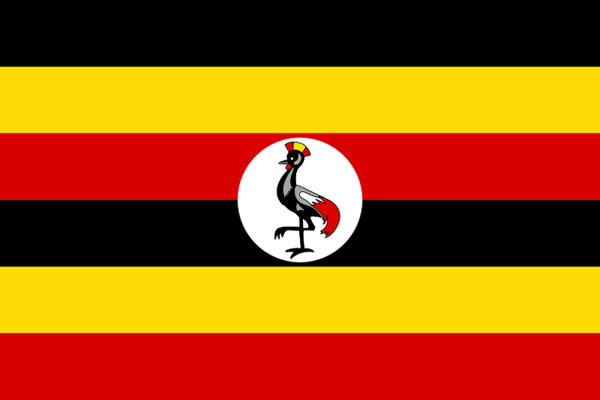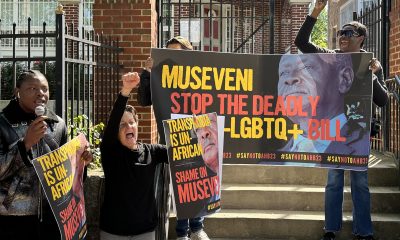World
Uganda president declines to sign queerphobic bill
Measure sent back to Parliament for review

Ugandan President Yoweri Museveni has refused to sign the country’s infamous “Sexual Offenses Bill” that Parliament approved in May, on grounds that it details offenses already covered by pre-existing laws.
“President Museveni has rejected to assent to the Sexual Offenses Bill, saying many provisions are redundant and already provided for in other legislations,” the Daily Monitor reports. “Deputy Speaker of Parliament Anita Among made the communication to the House …”
The bill has been returned to the Parliamentary Committee on Legal Affairs for review “to address the redundancies.”
Although this is a positive development for LGBTQ Ugandans and activists, the East African country is embroiled in harsh queerphobic sentiment institutionally. And there still exists a culture that makes it unsafe to live in Uganda as a queer person.
The Washington Blade spoke with Ikechukwu Uzoma, staff attorney for RFK Human Rights, and Adrian Jjuuko, executive director of Human Rights Awareness and Promotion Forum (HRAPF), before Museveni’s announcement about the details of the Sexual Offenses Bill and how its enactment could reshape Uganda’s LGBTQ landscape.
What is the Sexual Offenses Bill?
The Sexual Offenses Bill, which MP Monicah Amoding originally introduced in 2015, “seeks to consolidate laws relating to sexual offenses and provide procedural and evidential requirements during trial of sexual offenses and proposes several measures to check among others, sexual harassment in schools by guardians or teachers.”
The bill would also criminalize same-sex relationships and sex work.
“The laws were passed … reiterating sections of legislation first enforced in the country by British colonial rule,” the Guardian reports. “They condemn same-sex couples who perform acts deemed against the ‘order of nature’ to 10 years’ imprisonment.”
OutRight Action International also notes “same-sex relations have been criminalized in Uganda since British colonial times in sections 145 on ‘unnatural offenses’ and 148 on ‘indecent practices’ of the Penal Code, with a maximum sentence of life in prison foreseen. Clause 11 of the Sexual Offenses Bill further confirms this existing criminalization.”
Parliament passed the bill in May of this year. Questions regarding its legitimacy rose among LGBTQ individuals and activists as Museveni won his sixth presidential term and new MPs were sworn in.
“[When the bill was enacted], that was a time when Parliament was coming to an end, before we went into elections and [installed] a new Parliament,” said Jjuuko. “So when the new Parliament was sworn in, there was a question around what the actual legal status of a bill was that had been passed by Parliament, but not signed by the president.”
Although the proposed legislation went through an “in limbo” phase and was not fully bonafide, Jjuuko said Ugandans treated the legislation as if it were fully implemented.
“In Uganda, the law matters, but it also doesn’t. In other words it doesn’t matter what the situation is. With what the law right now is, the persecution of LGBT people will remain,” said Jjuuko.
Jjuuko further mentioned that when politicians have legislative ideas, they campaign for them in Parliament discussions and media appearances, thereby signalling to the country’s population the seriousness of whatever ideas they propose. Additionally, the word “bill” in Luganda, the country’s local language, has the same translation as the word “law.”
These campaigns, coupled with the lack of a clear distinction between a bill and law in Luganda, create a general culture where the country’s population will behave as if it were an instituted law, regardless of whether it has been signed or not.
In response to what this means for law enforcement officials and how they would treat LGBTQ citizens, Jjuuko said that police officers rely on a new form of LGBTQ persecution: Charging individuals with committing “negligent acts.”
“The police, who should know better, usually charge people with either an existing offense or some new offense,” said Jjuuko. “There’s now a new trend in Uganda [where police officers] charge someone with negligent acts of spreading disease infections, and this comes from provisions in the old penal code which is not even about COVID-19. It just [resurfaced when the pandemic began].”
Jjuuko also said the police are aware that they’re unable to charge an individual with “carnal knowledge.” They hence resort to charges of participating in intimate acts that can spread disease infections. So, even though general conversations focus on minimizing the spread of COVID-19, the larger picture depicts a commercial campaign to curb LGBTQ rights in Uganda.
This has led to an increase in mass arrests of LGBTQ individuals, with 44 people being arrested as recently as June, and consequently being charged with breaching pandemic restrictions as they pertain to the sizes of public gatherings.
What’s next?
Now that Museveni has refused to assent the bill, it has been returned to Parliament for further review. It will be presented to him again for re-consideration.
Jjuuko mentioned that if Museveni refuses to assent the bill once again, Parliament can enact it into a law by voting and taking advantage of what they call a “supermajority.”
In the event this happens Uzoma said, “it’s very easy, we [RFK Human Rights] just follow [Jjuuko’s] lead, and do whatever he tells us to do. [However], I think that [the bill being passed] really does change the matrix of decision making and planning.”
Uzoma further mentioned that whatever work RFK Human Rights is currently doing they will continue to do. If the bill is passed, it is inevitable that there will be more arrests and convictions. Therefore, the U.N.-style engagements that RFK Human Rights has had in the past around such detentions would continue.
Uzoma also said that the RFK Human Rights would also probably create a well-structured campaign that not only serves those in Uganda, but also covers the extraterritorial jurisdiction components detailed in the bill that would make it illegal for Ugandans to participate in same-sex relations outside of the country.
Jjuuko is certain his advocacy work will persist.
“I know for sure that whatever happens, our work will go on. Nothing is going to stop us because I kind of feel like we’ve lived through worse,” said Jjuuko.
Jjuuko is aware of society’s progress with adopting more favorable views of the LGBTQ community and has emphasized that this has also influenced progress for Uganda.
“There’s positive continuous progress [and] they are fighting us because they know that we are winning and making progress. So, [the endless persecutions] are signs that [the government] also realizes something is wrong in their own strategy of making sure that there are no LGBTI people in Uganda,” said Jjuuko.
Kenya
Kenya Red Cross-owned hotel to host anti-LGBTQ conference
Speakers from US, European countries to participate in May 12-17 gathering

Plans to host a family values meeting next month in a 5-star hotel in Nairobi that the Kenya Red Cross Society co-owns have sparked an uproar among local queer rights groups.
The groups accuse the Kenya Red Cross of violating its Global Fund commitment of protecting key populations by allowing its Boma Hotel to host an “anti-gender and anti-LGBTQ” conference.
Influential guest speakers from the U.S., the Netherlands, Spain, and Poland will preside over the Pan-African Conference on Family Values that will take place from May 12-17. The Kenyan advocacy groups say these speakers’ organizations are globally recognized for undermining LGBTQ rights.
“As the principal recipient of Global Fund in Kenya, hosting this event contradicts (the) Red Cross’s humanitarian mission and threatens the safety and dignity of people living with HIV, women and LGBTQ+ individuals, the communities that Kenya Red Cross Society has long committed to supporting,” the queer rights groups state.
The LGBTQ groups that have criticized the Kenya Red Cross include Upinde Advocates for Inclusion, the Initiative for Equality and Non-Discrimination, and Gay and Lesbian Coalition of Kenya. They have also launched an online signature collection drive to compel the Kenya Red Cross to withdraw the hotel from hosting the “Promoting and Protecting Family Values in Challenging Times”-themed conference.
“The event’s so-called ‘family values’ narrative is a smokescreen for policies that push hateful legislation and promote death, discrimination, femicide, gender-based violence, and restrict fundamental freedoms across Africa,” the groups said.
The pro-life Western organizations that are scheduled to participate in the conference include Family Watch International from the U.S., CitizenGo from Spain, the Ordo Luris Institute from Poland, Christian Council International from the Netherlands, the New York-based Center for Family and Human Rights (C-FAM), and the Foundation for American Cultural Heritage. Their local counterparts include the National Council of Churches of Kenya, the Kenya Christian Professionals Forum, the Africa Christian Professionals Forum, and the Evangelical Alliance of Kenya.
C-FAM President Austin Ruse; Family Research Council Vice President for Policy and Government Affairs Travis Wever; Global Life Campaign Executive Director Thomas W. Jacobson; and the Rev. Ricky Chelette, executive director of Living Hope Ministries, Inc., and president of the Institute of Biblical Sexuality are among the U.S. guest speakers. Other participants include Henk Jan van Schthorst, president of Christian Council International’s board of directors, Ordo Luris Institute President Jerzy Kwasniewskie and his colleague, Rafal Dorosinski, director of the group’s Legal Analysis Center.
The Kenyan groups through their online petition — “Tell Red Cross Kenya Not to Give Hate a Platform” — has so far raised more than 1,000 of the 10,000 signatures they hope to collect. The petition is addressed to Red Cross Kenya Secretary-General Ahmed Idris and his predecessor, Abbas Gullet, who is the hotel’s director.
“We call on you to immediately cancel this booking and publicly reaffirm Red Cross’ commitment to human rights, health and inclusivity,” the petition reads. “Failure to act will raise concerns about whether (the) Red Cross can still be trusted by the community to lead with empathy and fight for their rights.”
The Kenya Red Cross, however, maintains the Boma Hotel is a separate entity, even though public records indicate it is one of the facility’s shareholders.
The LGBTQ groups note the hotel should be a safe space that promotes inclusion, not platforms that enable “harmful gathering” for hate and exclusion by “dangerous groups.”
“By providing a venue for this event, Red Cross directly enables a platform for hate and discrimination — a stark contradiction to the values of inclusivity, humanity, and nondiscrimination that the organization claims to uphold,” they said.
The organizations further warn that proceeding to host the conference threatens the relationship between the Red Cross and the marginalized communities who have long depended on the humanitarian organization for support and protection. CitizenGo has nonetheless criticized the LGBTQ groups, which it describes as “radical activist groups” for “trying to silence a pro-family event” and asked the Kenya Red Cross and the Boma Hotel not to back down.
“These groups are calling the event ‘hateful’ because it affirms the natural family — marriage between a man and a woman — and the dignity of every human life, including the unborn,” Ann Kioko, the group’s campaign director for Africa and the U.N., said.
Through an online counter signature collection drive, Kioko holds CitizenGo and other groups won’t be intimidated, silenced or apologize to the queer rights groups for defending “our families, our faith and our future”.
“The real goal of these foreign-funded activist groups is to impose LGBTQ and gender ideologies on Africa — ideologies that have led elsewhere to the confusion of children, the breakdown of family structures and the rise of sexual libertinism that results in abortion, STIs and lifelong emotional and psychological trauma,” Kioko stated.
India
Opposition from religious groups prompts Indian Pride group to cancel annual parade
Event was to have taken place in Amritsar on April 27

Pride Amritsar, a student-led organization in the Indian state of Punjab, earlier this month announced the cancellation of its Pride parade that was scheduled to take place on April 27, citing opposition from certain religious groups.
The event, planned for the Rose Garden in Amritsar, a city revered as a spiritual center of Sikhism, had faced mounting resistance from Sikh religious organizations, including the Nihang Singh faction and the Akal Takht, the faith’s highest temporal authority. These groups labeled the parade as “unnatural” and urged local authorities to deny permission, citing its potential to disrupt the city’s religious sanctity.
In an Instagram post on April 6, Pride Amritsar organizers Ridham Chadha and Ramit Seth elaborated on its mission and the reasons for the cancellation.
“Since 2019, we have organized peaceful parades and celebrations in Amritsar to connect and uplift the LGBTQIA+ community, with a particular focus on transgender individuals and their rights,” their statement read.
Chadha and Seth highlighted Pride Amritsar efforts in providing guidance, counseling, and job opportunities, which have been met with positive responses. However, due to opposition this year, Pride Amritsar announced the cancellation of the 2025 parade.
“We have no intention of harming the sentiments of any religious or political groups,” the statement read. “The safety of our members is our top priority, and we will take all necessary measures to ensure their protection.”
Chadha and Seth spoke with the Washington Blade about their decision to cancel the parade.
They explained that resistance came from both religious and political groups who labeled the parade and its values as anti-Sikh and contrary to Punjabi and Indian cultural norms. Critics specifically objected to the event’s location in Amritsar, a city regarded as a sacred center of Sikhism, arguing that the parade would disrupt its spiritual purity.
Chadha and Seth stressed Pride Amritsar lacks political, financial, or legal support. Composed of students and young professionals, the group organizes the parade biennially, dedicating personal time to advocate for the LGBTQ community.
“We do it independently, crowdfund the parade and cover the rest with our pockets,” said Seth and Chadha.
When asked by the Blade why Pride Amritsar did not approach the High Court or local authorities to protect the parade, despite the Supreme Court’s 2018 ruling that decriminalized consensual same-sex sexual relations, Chadha and Seth cited significant barriers.
“Pursuing legal action in India requires substantial resources, both financial and temporal,” they explained.
Chadha and Seth also noted that such action could lead to public shaming and unwanted publicity for participants, potentially harming their careers in Amritsar. They therefore chose not to pursue legal recourse.
Chadha and Seth said Pride Amritsar does not have any plans to hold alternative events.
“We are still exploring options, but we are likely not holding any events this year,” they said, citing significant harassment that organizers faced and the need for time to plan how to best serve the local LGBTQ community moving forward.
“Our evaluation of what the biggest challenge is has changed after this year,” said Chadha and Seth to the Washington Blade. “The biggest challenge, by far, seems to be education. We need to educate the community about what the community is, does, and why it exists. Why we do parades. Why we dance. Why calling someone ‘chakka’ is harmful. How we actually fit into religion and fall within the guidelines.”
Chadha and Seth said organizing the parade in Amritsar since 2019 has been an uplifting experience, despite continued opposition.
“The moment you join the parade, chant a slogan, or sing a song, it’s transformative,” they said. “Fear vanishes, and a sense of freedom takes over.”
The cancellation of the 2025 Amritsar Pride Parade has sparked concerns among activists in Punjab, as the Indian Express reported.
The Punjab LGBT Alliance and other groups expressed concern that the decision to cancel the parade may strengthen opposition to future LGBTQ-specific events.
Australia
Australian LGBTQ rights group issues US travel advisory
Equality Australia warns transgender, nonbinary people of ‘serious risks’

An LGBTQ rights group in Australia has issued a travel advisory for transgender and nonbinary people who plan to visit the U.S.
Equality Australia on April 14 posted the advisory to its website that states the U.S. government’s policy on visas and Electronic System for Travel Authorization or ESTA “appears to be” the following:
• To use the term “biological sex”
• To only use the gender marker recorded at a person’s birth, even if this differs from their gender
• That valid foreign passports with an ‘X’ gender marker and a valid visa (if needed) may continue to be admitted, however this is contingent upon satisfying inspection of their admissibility by the U.S. Customs and Border Protection officer at the port of entry
• That any previously issued, valid visa may remain current until its expiration date and the visa holder does not need to apply for a new visa with an amended gender marker until the current visa expires (it is unclear whether this applies to ESTAs)
• That new visas will only be issued under the gender marker recorded for the applicant at birth (it is unclear whether this applies to ESTA applications, although only ‘M’ and ‘F’ gender marker options are available for ESTA applications)
• That if consular officers assessing visa applications become aware an application does not contain the gender marker recorded at the applicant’s birth, they should assess additional evidence (such as previous travel records, although the scope is unclear), and/or conduct interviews and
• That where individuals are not using the gender marker recorded at their birth, consular officers should consider classifying the application as procuring a visa through material misrepresentation or fraud, which results in a lifetime bar from the U.S.
President Donald Trump shortly after he took office on Jan. 20 issued an executive order that bans the State Department from issuing passports with “X” gender markers. Secretary of State Marco Rubio in response to directive ordered State Department personnel to “suspend any application requesting an ‘X’ sex marker and do not take any further action pending additional guidance from the department.” A federal judge in Boston on April 18 issued a temporary injunction against the Trump-Vance administration’s directive.
Equality Australia says its advisory is “relevant if you are traveling to the U.S.” and fall under the following criteria:
• Hold a passport with a gender ‘X’ marker
• Have identity documents with gender markers different to those assigned to you at birth, or where other relevant details (such as your name) have been changed
• Have gender markers in your identity documents that do not match your gender expression
• Have a track record of LGBTIQ+ activism or other political activity.
“Travel to the U.S. carries serious risks that should be considered before planning any travel, particularly if you fall under one of the above categories,” reads the advisory.
Germany, Denmark, Finland, and the Netherlands are among the countries that have issued travel advisories for trans and nonbinary people who plan to visit the U.S.
WorldPride is scheduled to take place in D.C. from May 17-June 8.
InterPride, the organization that coordinates WorldPride events, on March 12 issued its own travel advisory for trans and nonbinary people who want to travel to the U.S. Egale Canada, one of Canada’s largest LGBTQ advocacy organizations, in February announced its members will not attend WorldPride and any other event in the U.S. because of the Trump-Vance administration’s policies.
-

 Federal Government3 days ago
Federal Government3 days agoHHS to retire 988 crisis lifeline for LGBTQ youth
-

 Opinions3 days ago
Opinions3 days agoDavid Hogg’s arrogant, self-indulgent stunt
-

 District of Columbia3 days ago
District of Columbia3 days agoD.C. police seek help in identifying suspect in anti-gay threats case
-

 Virginia3 days ago
Virginia3 days agoGay talk show host wins GOP nom for Va. lieutenant guv












